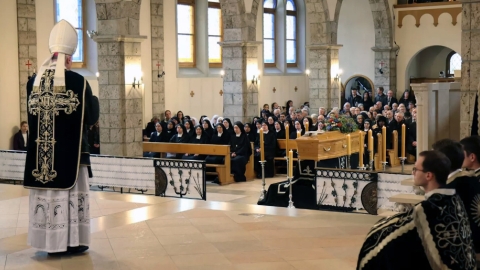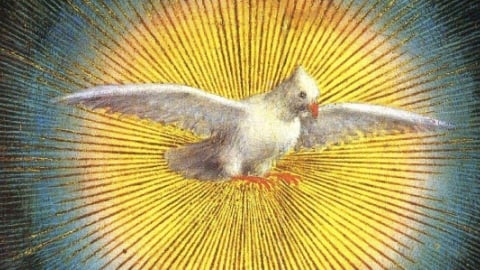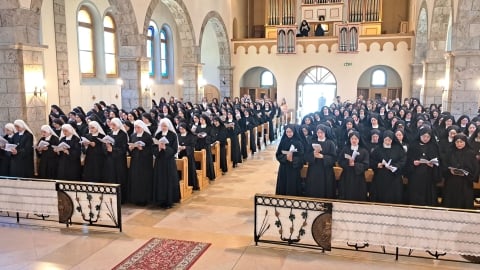May as the Month of Mary: East and West

Roman Catholics have a deep history of honoring the Blessed Virgin Mary during the month of May. This devotion, which developed over the course of centuries in the West, spread and connected to Marian devotions indigenous to the Christian East, leading Catholics all over the world to make May a special time to praise God’s Immaculate Mother.
May as the Month of Mary in the West
As early as the 13th century, Latin Catholics began designating May as a special month to honor the Blessed Virgin Mary. Prior to his repose in 1284, King Alphonsus X of Spain, in one of his poems, sings of May as the month of Mary, describing how the people gather round her altar to sing her glories and pray for protection from all harm.
Not long after, the German monk Blessed Henry Suso, O.P., adopted the practice of honoring Mary in a special way during springtime. He would gather flowers, weave them into a crown, and then place it on the statue at Our Lady's altar. On one occasion he was privileged to hear angel choirs joining him in singing Mary’s praises, and another time he heard them singing the Magnificat. Similar devotions spread throughout Germany in the succeeding centuries.
By the 18th and 19th centuries, both the Society of Jesus (Jesuits) and the Congregation of the Most Holy Redeemer (Redemptorists) had distributed devotional literature singling out May as a special time to honor the Queen of Heaven. Public liturgical celebrations became normative throughout Europe, eventually making their way to North America and missionary lands as far as China.
By the 20th century, devotion to Mary in May had become so beloved by Latin Catholic faithful that Pope Pius XII established the Feast of the Queenship of Mary on May 31 in his 1954 encyclical Ad caeli reginam. Though Paul VI would transfer this feast to August for the Novus Ordo missal, it is still celebrated in May by traditional Catholics following the 1962 missal. In establishing the feast, Pius XII observed:
From the earliest ages of the Catholic Church a Christian people, whether in time of triumph or more especially in time of crisis, has addressed prayers of petition and hymns of praise and veneration to the Queen of Heaven and never has that hope wavered which they placed in the Mother of the Divine King, Jesus Christ; nor has that faith ever failed by which we are taught that Mary, the Virgin Mother of God, reigns with a mother's solicitude over the entire world, just as she is crowned in heavenly blessedness with the glory of a Queen.
May Marian Devotions Head East
Within Eastern Christendom, there is no shortage of feast days and devotions honoring the Mother of God. Of the 12 Great Feasts recognized on the Byzantine Calendar, a third are dedicated to Our Lady: Nativity of the Mother of God; Presentation of the Mother of God; Annunciation; and Dormition (Assumption). Although there are no universal Marian feast days listed on the Byzantine Rite Calendar, smaller Marian feast days are widespread throughout the East with towns, regions, and monasteries giving special praise to wonder working icons of the Mother of God and local Marian miracles. Eastern Christians celebrating according to other calendars and rites have their own special days dedicated to Mary.
With the reunification of previously separated Eastern churches with Rome over the centuries, it is not surprising to find Latin fervency for the Blessed Virgin having a marked influence on these communions.
The Syro-Malabar Catholic Church, which is based in Kerala, India, has a long history of Marian devotions or vanakkamasa prarthankal. Borrowed in large part from the West, these devotions include praying the Rosary; building a special altar or designated era of prayer dedicated to Mary in the home; and consecrating oneself and one’s family to the Blessed Virgin.
The Maronite Catholics of Lebanon, who never formally broke communion with Rome despite centuries of separation due to geographic and political barriers, have a rich tradition of honoring Mary in May that parallels those found among Latin Catholics. While Latin Catholics typically assign Saturday as a special day for Marian devotion, Maronites honor her on Wednesday, as they believe this is the day the Blessed Virgin fell asleep in the Lord. In addition to May, Maronites also set aside the months of August and October to honor the Queen of Heaven. One Maronite prayer to Mary reads as follows:
O Mary, Queen of the Mountains and Seas, Queen of our beloved Lebanon, whose glory is given to you, and whom you wished to be your emblem. O Virgin, whose purity rivals the snow of Lebanon, rise in glory like the cedars of Lebanon. We beg you to lay your motherly eyes on all your children and extend your pure arms to bless us. Amen.
The Chaldean Catholic Church, which uses the East Syriac Rite and is headquartered in Baghdad, Iraq, has also adopted the practice of honoring God’s Mother in May. Centuries before it re-established communion with Rome, the Chaldeans decreed May 15 as the Feast of Our Lady of the Fields. During this celebration, the faithful supplicate Mary to bring forth a good harvest and spread her protection over families. The Chaldeans also have a special prayer for this day that can be used throughout the year.
Dear Mother, you lived a humble life centered around God early in your life and then dedicated to raising the Son of God. My lady, ask our Lord Jesus to place deep faith in our hearts and water it each day with your prayers, that we may bring a worthy harvest of holiness in service of God as you did.
Pray that as our hearts grow in love and humility, we may be a living sign of Jesus to those around us. Like a farmer who uses his hands to bring forth nourishing food, please ask Jesus to bless us with a bountiful harvest.
Pray that our hands and bodies will remain strong, that we may farm the land God has given us and to minister in His vineyard.
Ask Jesus to care for our gardens as He tends our hearts. Pray that weeds will be kept far from our fields and that we have a distaste for sin.
Humbly we ask that you carry the petitions we hold in our hearts to our most loving and generous Lord, so that a bountiful return of praise to our savior can be presented on the last day. We ask this from you and from your wonderful spouse St. Joseph. Amen.
A Special Devotion Among Greek Catholics
As mentioned, those Catholics following the Byzantine Rite, known as Greek Catholics, possess a strong tradition of honoring Mary. In light of their Latin brethren’s special fervency during May, various Greek Catholic churches have followed suit, blending Latin praxis with their own tradition.
One prominent example of this is holding special supplication services to the Blessed Virgin throughout the month. Known as a paraklasis in Greek or moleben in Slavonic, this service is structured like Matins with the intoning of Psalms 142 and 50, the reading of the Gospel, and the chanting of a canon or prayer to the Mother of God. In their most lavish form, molebens may include a full procession in or outside the church and additional blessings, such as sprinkling with holy water or anointing.
Within the Ukrainian Greek Catholic Church, the moleben to Mary incorporates certain Latin devotional elements, such as a modified version of the Litany to the Blessed Virgin Mary, with the faithful responding in the traditional Eastern manner: “Most Holy Mother of God, save us.” One popular set of petitions is the following.
Blessed Virgin Mary, Theotokos (Bearer of God) and All-Merciful, rejoice and save those who trust in you.
Mother of Christ our God, rejoice and save those who trust in you.
Mother of Eternal Love, rejoice and save those who trust in you.
Mother of God’s graces, rejoice and save those who trust in you.
Immaculate Virgin, rejoice and save those who trust in you.
Virgin brighter than the cherubim, rejoice and save those who trust in you.
Virgin, more glorious than the seraphim, rejoice and save those who trust in you.
Mary, immaculate dove, rejoice and save those who trust in you.
Mary, sweet-smelling fragrance, rejoice and save those who trust in you.
Mary, good intercessor of young virgins, rejoice and save those who trust in you.
Mary, veil wider than the clouds, rejoice and save those who trust in you.
Mary, implorer of the righteous Judge, rejoice and save those who trust in you.
Mary, comforter of those who mourn, rejoice and save those who trust in you.
Mary, refuge of sinners, rejoice and save those who trust in you.
Mary, Intercessor, who did not leave us at your Assumption, rejoice and save those who trust in you.
Mary, the only pure and blessed, rejoice and save those who trust in you.
Regardless of geographic location, church structure, or rite, Catholics have come to embrace May as a time to pay honor to Mary, the Mother of God and Queen of Heaven. By her prayers and the prayers of all the saints, may we be protected during our time on earth and find eternal joy in the Kingdom of Heaven.
sspx.org - 05/10/2023





